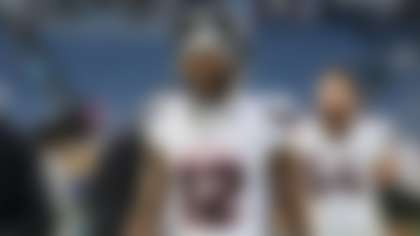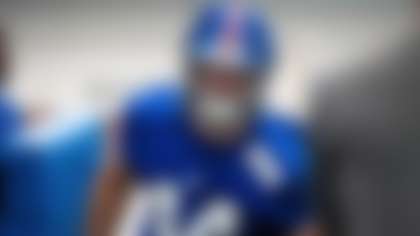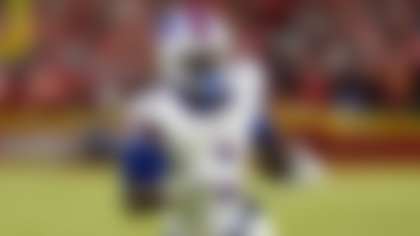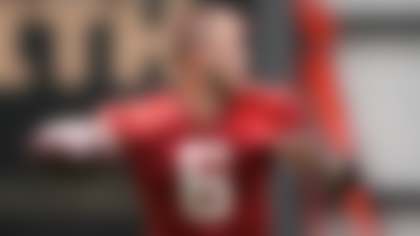Ever since indoor football became a part of the NFL, I have always wanted to be the general manager of a dome team.
My reasoning is simple: A dome with incredible crowd noise makes an average team good, a good team great and a great team a Super Bowl winner. The No. 1 advantage an offense has over the defense is the snap count, but that advantage disappears in a road dome. It's harder to run the ball, which makes it harder to pass protect, which derails an offense's flow.
My ideal dome team would be big, with the ability to control both lines of scrimmage indoors yet still function well in the elements. The little, quick dome team never interested me -- a lack of size becomes a major disadvantage outdoors. I would always evaluate players outdoors, though, knowing a dome makes some guys look better than they really are. And one cornerstone of my team would be a defensive line resembling the New York Giants' unit.
This leads us to the Atlanta Falcons. Atlanta laid another egg in the postseason, losing to the Giants 24-2 in the Meadowlands. Mike Smith's Falcons have been to the playoffs in three of his four seasons, but they have yet to win a game. They made a bold move to acquire Julio Jones in the 2011 NFL Draft, believing Matt Ryan needed another explosive playmaker. Jones is an enticing talent, but did it really benefit Atlanta to give up all those picks and ignore team needs? I didn't think so then, and certainly haven't changed my tune nowadays.
The Falcons have fallen into the dome trap: evaluating the teams' overall talent at home, instead of on the road, where the purest evaluation must take place.
They clearly misjudged the overall talent level on defense, as their most effective player is still aging defensive end John Abraham. Not Ray Edwards, who they signed to a big contract last offseason. Not Dunta Robinson, who inked another big deal two years ago. Not Peria Jerry, whom they drafted in the first round back in 2009. Not Sean Weatherspoon, another first-round pick in '10. Outside of Abraham and corner Brent Grimes, this defense desperately needs a fresh influx of talent, particularly at safety and defensive tackle.
On offense, Atlanta never solved glaring problems on the line. Right guard was a weak spot all season, as the Falcons couldn't figure out the right combination of Joe Hawley, Mike Johnson and Garrett Reynolds on the interior. Nor could they find a solution at left tackle; former first-round pick Sam Baker was ineffective and had to be replaced by free agent Will Svitek.
With all of these issues, does Atlanta sound like a team that's a player or two away? No way. And that's why the humiliating loss to the Giants must be used as a measuring stick for every component of the team. The Falcons cannot hide behind a shiny home record and believe they're on the cusp of taking the next step. They are a good team, not a great team. Atlanta must identify core of players who are good enough to win on the road, and let the others move on.
A grand evaluation always begins at quarterback. Last week, I wrote that Matt Ryan needed to play well against the Giants to help the Falcons make a determination of his value as it relates to the other quarterbacks in the NFL. But Ryan fizzled yet again, continuing a trend of subpar postseason play. The book on Ryan away from the Georgia Dome is simple: Pack the middle of the field and force him to throw the ball outside the numbers (deep outs, comebacks, nine routes). Ryan isn't likely to beat you if you take away inside throws. Although Ryan may not be a top-10 quarterback at this point, the Falcons must continue to build around him because there is no viable alternative.
Atlanta must continue to help Ryan, and the biggest need is a quick inside receiver who can win against tight, man-to-man coverage when teams pack the middle of the field. Building a great receiving corps is like building a basketball team -- everyone has to fulfill different duties. Look at the Saints: They have two point guards in Lance Moore and Darren Sproles, an off guard in Devery Henderson, a small forward in Robert Meachem, a power forward in Marques Colston and a center in Jimmy Graham. All of them provide different skill sets, making coverage nearly impossible. Each week the Saints find their advantage and run the offense through it. Smart football. But the Falcons don't have a versatile group, which significantly limits their offense.
The Falcons have plenty of work to do, and it'll be even tougher without all those draft picks. But the first step is taking an honest look in the mirror and acknowledging the true state of the franchise.
Follow Michael Lombardi on Twitter @michaelombardi



